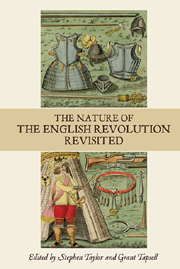Book contents
- Frontmatter
- Contents
- Preface and Acknowledgements
- List of contributors
- List of Abbreviations
- 1 Charles I and Public Opinion on the Eve of the English Civil War
- 2 Rethinking Moderation in the English Revolution: The Case of An Apologeticall Narration
- 3 The Parish and the Poor in the English Revolution
- 4 Body Politics in the English Revolution
- 5 The franchise Debate Revisited: The Levellers and the Army
- 6 Oliver Cromwell and the Instrument of government
- 7 ‘de te fabula narratur’: The Narrative Constitutionalism of James Harrington's Oceana
- 8 Democracy in 1659: Harrington and the Good Old Cause
- 9 The Restoration of the Church of England, 1660–1662: Ordination, Re-ordination and Conformity
- 10 Style, Wit and Religion in Restoration England
- 11 A British Patriarchy? Ecclesiastical Imperialism under the Later Stuarts
- Index
- Studies in Early Modern Cultural, Political and Social History
3 - The Parish and the Poor in the English Revolution
Published online by Cambridge University Press: 05 July 2013
- Frontmatter
- Contents
- Preface and Acknowledgements
- List of contributors
- List of Abbreviations
- 1 Charles I and Public Opinion on the Eve of the English Civil War
- 2 Rethinking Moderation in the English Revolution: The Case of An Apologeticall Narration
- 3 The Parish and the Poor in the English Revolution
- 4 Body Politics in the English Revolution
- 5 The franchise Debate Revisited: The Levellers and the Army
- 6 Oliver Cromwell and the Instrument of government
- 7 ‘de te fabula narratur’: The Narrative Constitutionalism of James Harrington's Oceana
- 8 Democracy in 1659: Harrington and the Good Old Cause
- 9 The Restoration of the Church of England, 1660–1662: Ordination, Re-ordination and Conformity
- 10 Style, Wit and Religion in Restoration England
- 11 A British Patriarchy? Ecclesiastical Imperialism under the Later Stuarts
- Index
- Studies in Early Modern Cultural, Political and Social History
Summary
In October 1646, in the context of increasingly bitter political and religious conflicts within Norwich, the anonymous author of Vox Norwici defended the presbyterian ministers of the city against Independent claims that they had been neglecting their responsibilities towards the poor:
our whole City knowes that our Ministers have ever, but especially of late laid downe the Doctrine of Charity, and Almes, almost in all their Sermons, and zealously pressed the care of the poore, even till they have reaped much ill will of divers; And God hath made their Ministry so successefull, as that the magistrates have doubled their reliefe by rates; so as the poore have hardly been ever so well provided for as now they be.
The passage, associating religious and political legitimacy with the proper exercise of charity, opens up a number of important themes in understanding poor relief during the English revolution. Most obviously, given its intent, it highlighted the role of ministers in exhorting their congregations, and rested their authority in part on their alliance with the magistracy, Sword and Word. It presented a puritanism actively pursuing policies to relieve the poor. Moreover, it took it as given that charitable obligations could be exercised through the formal mechanisms of parish relief: implicit is the congruence between the duties of charity and local taxation.
- Type
- Chapter
- Information
- The Nature of the English Revolution Revisited , pp. 53 - 80Publisher: Boydell & BrewerPrint publication year: 2013



